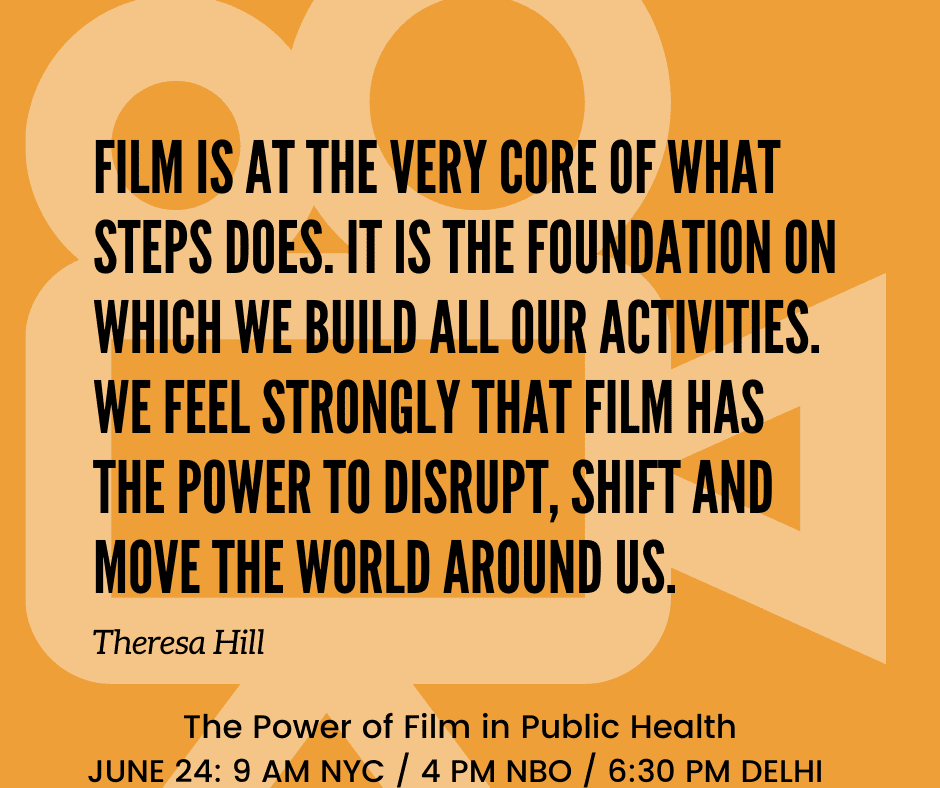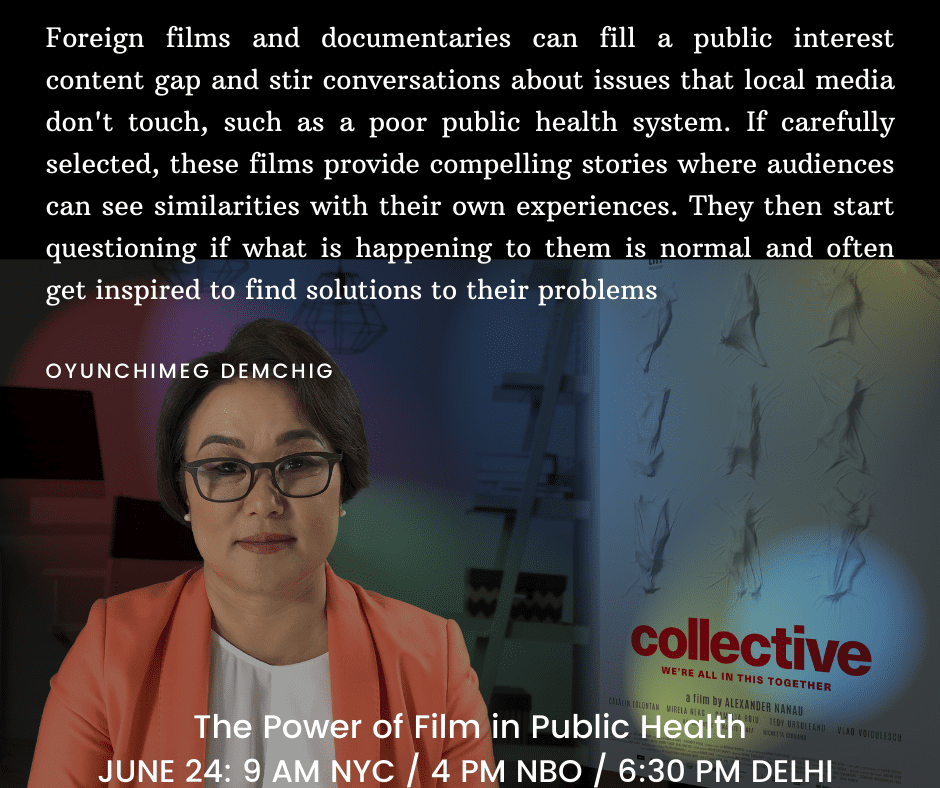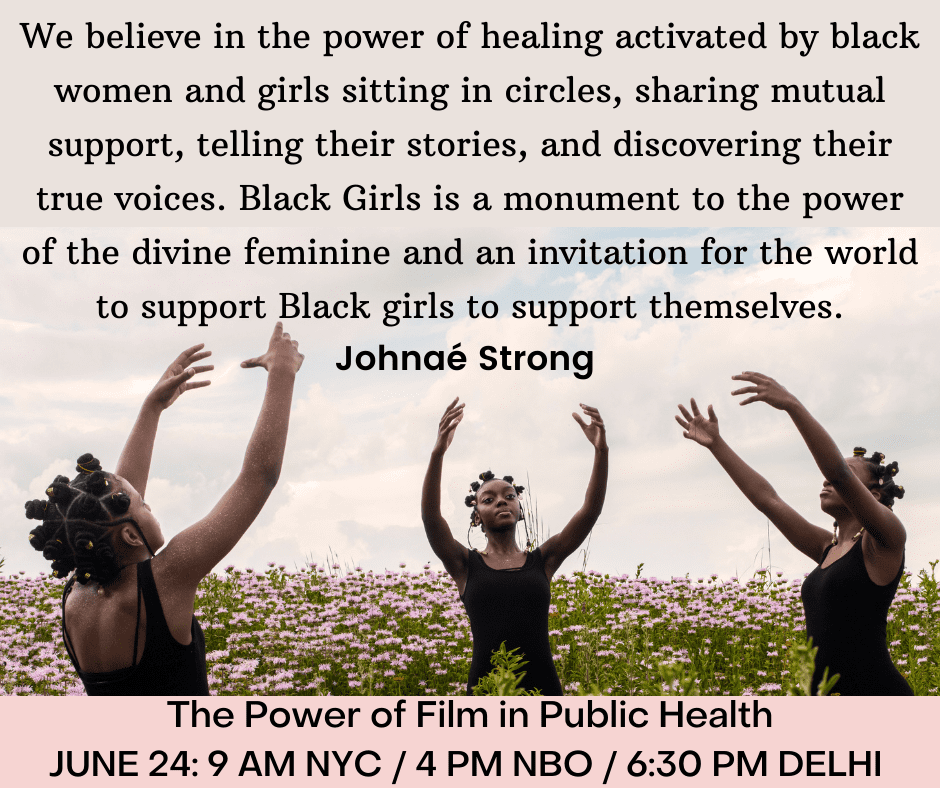By Kathryn Cleary
Health journalism takes shape in many forms, including online or print articles, podcasts, radio or television broadcasts, as well as documentary film. While film might be one of the most time-intensive and equipment-heavy mediums to work with, some of our Health Journalism Network members from all over the world have been using the power of film to impact health behaviors and social change in marginalized communities. In a webinar hosted in collaboration with the Internews Knowledge Series, the HJN heard from Gita Kiely, Director of FilmAid, Elaine Maane and Theresa Hill, from STEPS (South Africa), Oyunaa Demchig from The Mongolian Public Media Content Foundation (Mongolia), as well as Johnaé Strong and Cherrelle Swain from Black Girls Film (USA).
FilmAid
Kicking off the webinar, Kiely offers a quote from award-winning documentary film producer and director Deeyah Khan.
“What film and stories do is give us a tiny crack where we can each recognise our own humanity in someone else, in that space, we understand each other, and when we understand each other, we care. And once you do that, something better becomes possible.”
Deeyah Khan
Growing up in Chicago to immigrant parents from Iran, Kiely soon realised her reality was not reflected in the media around her, driving her into a career of storytelling. Before working at FilmAid, Kiely worked on notable films and television series like “The New Americans”, a documentary-series based on immigrant experiences in America, which was screened by PBS (Public Broadcasting Service).
FilmAid, a project of Internews, harnesses the power of film to inform, educate and inspire, says Kiely. FilmAid believes that creativity and participation drives change at an individual and community level, which contributes to positive social impact. “Collaboration is key,” emphasises Kiely. “Film projects are a labour of love.”
Any HJN members interested in getting in touch with FilmAid for suggestions, possible projects or collaborations please contact Kiely at [email protected]
STEPS
From South Africa, The Social Transformation and Empowerment Project (STEPS), a non-profit organisation, works to collaboratively produce documentary films and facilitate screenings in vulnerable communities across southern Africa. The films focus on human rights, social justice and health issues; STEPS was founded in 2001 after a collective of filmmakers, broadcasters, civil society organisations and people living with and affected by HIV/Aids began producing films in response to the HIV/Aids epidemic. More than 50 films have been produced so far and can be viewed for free online.

Theresa Hill, part of STEPS’ management team, says that the organization has trained facilitators to host community screenings. Sometimes, in rural or very remote areas, they use solar powered mobile cinema units, she adds.
STEPS also has an online documentary platform called AfriDocs. “Through this platform we’re able to respond quickly to issues that arise, for example in response to COVID-19 we were able to produce a few short films and have them available for streaming online for free,” says Hill.
Adding to Hill, Elaine Maane, part of STEPS’ training team, says that the organisation has partnered with nine civil society organisations in seven countries to increase community collaboration, particularly with youth. “We conduct training and facilitator workshops on how to use film as a tool to impact change by means of awareness raising and advocacy on social and environmental issues including health,” explains Maane.
STEPS works with young people in communities and trains them to be facilitators of film screenings. “The film resources that the young people use in the film screenings are all accompanied by a facilitator guide that helps them go through the issues that they’re going to be addressing in the specific areas. The facilitators have access to ongoing resources and receive mentorship from Steps which is largely via Whatsapp, now with COVID-19,” she says.
At the facilitated film screenings we collectively watch the film as an audience, and then the facilitator takes the audience through a guided discussion looking at the issues that the film has raised and linking to the bigger picture, says Maane. They then work with the audience to develop an action plan on how, as a collective, they can address these issues.
To get a glimpse of the facilitated film screenings watch this clip called “I am Sheriff
The Mongolian Public Media Content Foundation
In Mongolia, after 25 years at the country’s public broadcaster, Oyunaa Demchig, founded The Mongolian Public Media Content Foundation. Demchig left the public broadcaster (MNB) in response to ongoing social and political issues. “The Foundation positions itself as an alternative public interest media,” she says, and works to acquire high quality, topical, international content, and offer it for free distribution to mainstream media. The foreign content is usually accompanied by a local panel discussion where the issues in the film are localized. To date, the Foundation’s films have reached Mongolian audiences on 15 regional and 2 top five national tv stations.

“We are a team of [media] professionals that want to ensure that Mongolia is continuing its path to becoming a modern, democratic society, where anyone can make a decent living, worry-free of political and economic interests,” emphasises Demichig.
She adds that the Foundation contributes to the promotion of public interests, human rights and sustainable development goals by supporting the acquisition, commissioning, production and free dissemination of media content in Mongolia.
Mongolia’s media environment is challenging, and has what Demchig describes as a failed public interest media, opaque private media ownership and low quality journalism. One of the Foundation’s biggest successes is acquiring the 2020 Oscar nominated film Collective, which depicts endemic corruption in a post-communist country’s public health system very similar to Mongolia’s.
How did they do it? The Foundation fundraised to purchase the film’s license, translate, promote and dub the film into the local language. They also produced an interview with the protagonist of the film, Catalin Tolontan, a Romanian investigative journalist. The film and subsequent panel discussion was eventually broadcast on the MNB as well asmany other regional televisions stations.
Two days after the film’s first national broadcast, government officials in Mongolia resigned after protests triggered by a news story that showed the mistreatment by health workers of a mother and her newborn baby infected with COVID-19, says Demchig.
Check out more from the The Mongolian Public Media Content Foundation | Mongolia
Black Girls Film
Last, but certainly not least to present in this webinar, was Black Girls Film. Founder Johnaé Strong and producer Cherrelle Swain describe the project as a Black female led film and social impact campaign, one that builds curiosity, self determination, expression and self-love for Black girls and their communities in the USA and globally. The project has been ongoing for the past 2 years, says Strong, and is firmly anchored in the experiences of the Black women who are part of it.
“If you woke up as a Black woman in America…How would you feel?”
Black girls film
“[Black Girls Film is] much more than a film but a social impact campaign, as black women, as black filmmakers, focussing on highlighting the stories of other black girls and women, we’re just incredibly honoured to build a team and a black women crew,” says Swain.
The mission of Black Girls Film is to: unleash the power and potential of Black girls, build a sense of belonging between Black girls and champions of Black girls and put Black girls at the center of expertise.
The inspiration to do this kind of work stems from disturbing trends around stories that are told about Black women, says Swain. Through conversations with Black girls, Black Girls Film began collecting qualitative data to shape a narrative that more impact-fully and holistically represented the joy, resiliency and divinity of Black girls in America and the world, she adds. “We believe the possibilities are infinite!”

Keep an eye on Black Girls Film’s website for future updates and films!